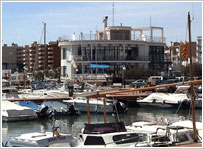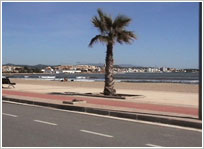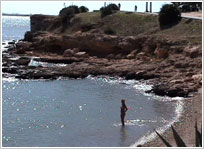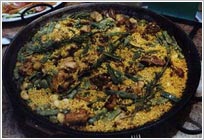|
|
|
| |
 |
 |
 |
 |
|
Where is L'Ampolla?
L'Ampolla is a fishing village on the North east coast of
Spain. Nowadays L'Ampolla has top class restaurants, mooring
for yachts and cruisers from all over the world and even
its own nightclub. L'Ampolla is located on the same latitude
as Majorca and on a clear day you can see the island from
La Mariona. L'Ampolla is part of the Golden coast or Costa
Dorada which is fast becoming one of Spain's most popular
resorts.
[ click here for weather in nearby Tortosa ]
What is the Costa Dorada?
The Costa Dorada - or gold coast - because of it's beautiful
sandy beaches is one of Spain's best kept secrets.
Extending southwards, from Barcelona to the marshes of the
Ebro Delta, this part of Catalunya attracts thousands of
visitors each year. People come to enjoy the climate and
pleasant lifestyle, the hospitality of the Catalan people,
their history and traditions. They also come to benefit
from the extensive sporting facilities in the ports and
marinas, leisure centres and golf courses.
All along its coastline, well-developed, sophisticated resorts
alternate with little villages and ports, where the traditional
life of fishermen continues almost unchanged. Miami Playa,
Sitges, Calafell, Salou and Cambrils are popular holiday
destinations, famous for their well-kept beaches and lively
nightlife, while localities like Torredembarra, Altafulla
and L'Ampolla offer the attraction of a calmer, more peaceful
lifestyle.
Only a short drive inland will take you to medieval monasteries
nestling amongst vineyards and groves or perched on solitary
hilltops.
[ History of Costa Dorada ]
Beaches and biology
L'Ampolla's beaches have very different characteristics
and including large sandy beaches, pebble beaches and small
coves.
There are two types of sandy beaches in l'Ampolla. Fine
golden sands characteristic of the Delta region and beaches
surrounded by reddish cliffs which, together with the blue
sea and the green pine trees, create a landscape of great
natural beauty.
As for coves, along the coast you will find several, surrounded
by an extraordinary landscape, which makes them ideal for
those who seek nature and peace.
In the centre of L'Ampolla the beach has been awarded the
blue flag 3 times for its cleanliness.
The village also has a volley-beach for the more energetic,
and several nearby restaurants, bars and stalls selling
drinks and snacks.
L'Ampolla also has lagoons. Les Olles is a lagoon at one
extreme of Arenal beach, It is the smallest lagoon in the
delta region (54 hectares wide). However, it provides accommodation
to a large colony of migratory birds. Its position near
the bay of el Fangar favours the existence of a great variety
of fauna and flora, difficult to find in other areas of
the Delta. The lagoon is featured in a set of routes called
the "Camins de la MediterrÓnea". The route is nicknamed
The Birds and the Rice and can be covered either on foot
or by bike. Along the route there are lookout towers and
written information on the typical flora and fauna of the
region.
History and geography
L'Ampolla's name comes from the shape of the mouth of the
Ebro river as it enters the sea. The name means bottle and
the delta takes the shape of an old Roman bottle or amphora
- many of which are still found today by local divers.
The region is unique in that water from the delta is used
to irrigate hundreds of acres of land - creating miles of
green "paddy" fields and a vast nature reserve attracting
thousands of rare birds and other fauna.
A gastronomic delight
Cooking has always been important to the Spanish, and L'Ampolla
has a culinary tradition the richness of which results from
a combination of products taken both from the river and
the sea.
As a seafaring village, L'Ampolla offers a wide variety
of fish and shellfish oysters, mussels, clams, prawns etc
complemented with delicious Mediterranean sauces.
Specialities of the Delta include FideuÓ (noodles cooked
with fish stock), Arr˛s negre (rice blackened by calamari
ink), Arr˛s a Banda (rice served with the fish used to prepare
the stock) and several other dishes based on the most traditional
product of the Delta - rice.
For dessert try the pastisset (a semicircular little cake,
usually filled with sweetpumpking), coca de brossat (a flat
sponge cake covered with curd-cheese) and “coquetes” (almond
cookies.
If you're really keen attend Oyster day when everyone is
invited to taste from a staggering 2,000 kg of oysters distributed
among those presents.
|
|





|
|
 |
 |
 |
 |
 |
Prices, availability and bookings |
 |
 |
 |
 |
|
á


